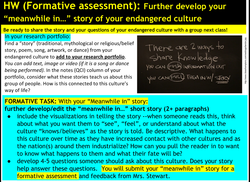HW: (formative assessment): improve your "meanwhile in..." story of your endangered culture The document you need to complete this formative is in your WH Drop folder.
Comments are closed.
|
Mrs. Stewart's CourseYou'll find a daily agenda posted here for each day that class meets Archives
May 2020
Categories |

 RSS Feed
RSS Feed